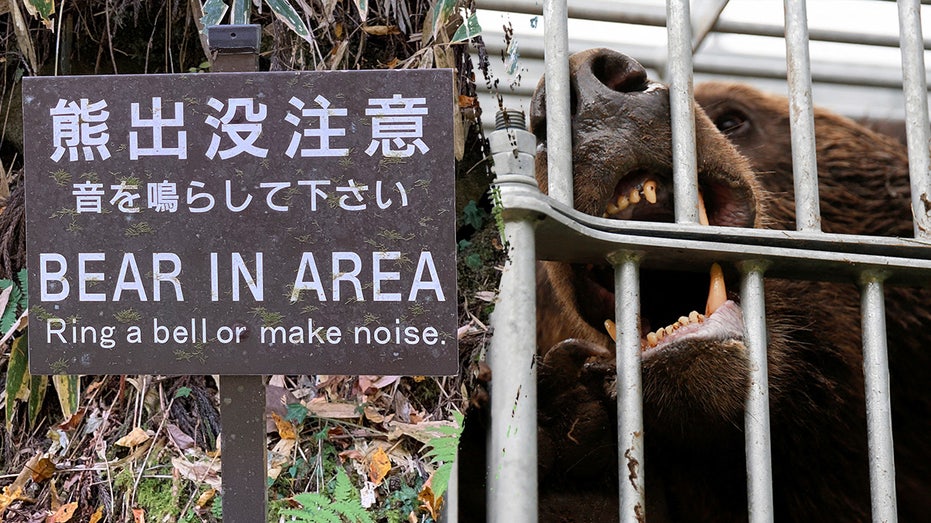Top Stories
Japan Deploys Military Amid Record Bear Attacks Nationwide

URGENT UPDATE: Japan is facing a crisis as authorities confirm the highest number of bear attacks on record, prompting the deployment of military assistance across the nation. This alarming surge, which has resulted in at least 12 deaths and over 100 injuries in 2025, has led regional officials to urgently request help from the Self-Defense Forces (SDF).
The situation has become dire, particularly in northern prefectures like Akita, Iwate, and Fukushima, where bears have been spotted encroaching on urban areas, including homes, schools, and shopping districts. This has forced temporary lockdowns in several rural communities, intensifying fears among residents about their safety.
In late October, Akita Governor Norihisa Satake formally appealed for military support as local authorities struggled to manage the escalating crisis. The SDF’s role is strictly logistical, focusing on transporting animal carcasses, setting traps, and patrolling forested areas where bear sightings have increased. Importantly, only licensed hunters will be allowed to shoot bears deemed an immediate threat, as outlined by defense officials.
The alarming rise in bear encounters can be attributed to several factors, including poor acorn and beech nut harvests, warmer winters delaying hibernation, and a shrinking hunter population. Reports indicate that approximately 60% of licensed hunters are over the age of 60, leaving rural areas with fewer responders to wildlife emergencies.
In response to this pressing issue, local governments in Akita, Niigata, and Hokkaido are ramping up efforts to attract new hunters by offering increased subsidies, training stipends, and per-bear bounties. This initiative is crucial as traditional bear trackers, known as matagi, retire, leaving a significant gap in local wildlife management.
Moreover, the crisis has sparked a national debate about the balance between wildlife conservation and public safety. While bears hold a revered place in Japanese folklore, symbolizing strength and endurance, rising attacks have led many residents to call for stricter control measures. Environmental groups, however, advocate for humane solutions and improved forest management rather than widespread culling.
The Environment Ministry is advising residents to remain vigilant, urging them to avoid forest edges, securely store garbage and food waste, and report bear sightings immediately. Authorities emphasize that this is a wildlife management crisis, not an all-out war on bears. However, for those living in northern Japan, the threat feels alarmingly close, with many residents expressing fear for their safety.
As this situation develops, residents and local officials are left grappling with the immediate impact on their daily lives and the pressing need for effective solutions. The nation watches closely as military assistance begins and local hunters are mobilized to confront this unprecedented crisis.
Stay tuned for further updates on this developing story as Japan navigates this urgent wildlife management challenge.
-

 Sports2 weeks ago
Sports2 weeks agoSteve Kerr Supports Jonathan Kuminga After Ejection in Preseason Game
-

 Top Stories1 week ago
Top Stories1 week agoMarc Buoniconti’s Legacy: 40 Years Later, Lives Transformed
-

 Business2 weeks ago
Business2 weeks agoTyler Technologies Set to Reveal Q3 2025 Earnings on October 22
-

 Science3 weeks ago
Science3 weeks agoChicago’s Viral ‘Rat Hole’ Likely Created by Squirrel, Study Reveals
-

 Politics3 weeks ago
Politics3 weeks agoDallin H. Oaks Assumes Leadership of Latter-day Saints Church
-

 Lifestyle2 weeks ago
Lifestyle2 weeks agoKelsea Ballerini Launches ‘Burn the Baggage’ Candle with Ranger Station
-

 Lifestyle2 weeks ago
Lifestyle2 weeks agoDua Lipa Celebrates Passing GCSE Spanish During World Tour
-

 Entertainment3 weeks ago
Entertainment3 weeks agoZoe Saldana Advocates for James Cameron’s Avatar Documentary
-

 World2 weeks ago
World2 weeks agoD’Angelo, Iconic R&B Singer, Dies at 51 After Cancer Battle
-

 Business3 weeks ago
Business3 weeks agoMLB Qualifying Offer Jumps to $22.02 Million for 2024
-

 Sports2 weeks ago
Sports2 weeks agoPatriots Dominate Picks as Raiders Fall in Season Opener
-

 Health2 weeks ago
Health2 weeks agoRichard Feldman Urges Ban on Menthol in Cigarettes and Vapes









